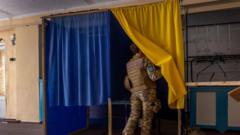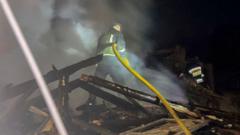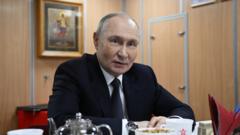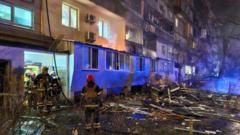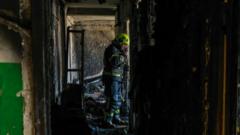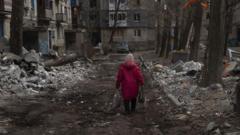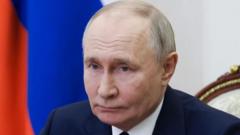The recent missile launch in Kryvyi Rih has killed 14 individuals, five of whom were children, while leaving many others injured. This attack, which hit a residential area near a playground, marks one of the most devastating assaults on the city, which is the home of President Zelensky. With a rising death toll expected, the incident underlines the dire civilian impact of the ongoing war.
Deadly Missile Strike in Kryvyi Rih Claims 14 Lives, Including Children
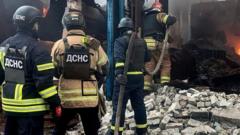
Deadly Missile Strike in Kryvyi Rih Claims 14 Lives, Including Children
A Russian missile attack on Kryvyi Rih has killed 14, including five children, intensifying concerns over civilian safety in ongoing Ukraine-Russia conflict.
In a tragic incident, a Russian missile struck the central Ukrainian city of Kryvyi Rih, resulting in the deaths of at least 14 individuals, including five children, as reported by local officials. Serhii Lysak, the head of the regional government, confirmed the unfortunate toll, while Oleksandr Vilkul, the local defense administration chief, stated that the ballistic missile landed in a residential area, causing significant damage.
The attack occurred just two days after a previous strike on the city, which is notable as the home of Ukrainian President Volodymyr Zelensky. That earlier strike claimed four lives and raised urgent questions about the safety of civilians amid the ongoing conflict. The latest missile hit a densely populated zone near a playground, prompting immediate emergency responses, including firefighting and rescue efforts, as several blocks of flats were also reported damaged.
Kryvyi Rih, situated approximately 40 miles (70 km) from the eastern front lines, is reportedly the longest city in Europe, housing around 600,000 residents. Authorities fear that the death toll may continue to rise as recovery operations comb through the wreckage.
This recent attack highlights the enduring risks faced by civilians in Ukraine amidst the ongoing war, intensifying scrutiny around the impact of missile strikes in populated areas and the broader humanitarian consequences of the conflict that began with Russia's full-scale invasion in 2022.



